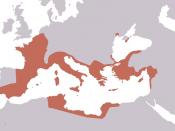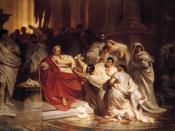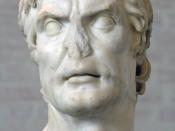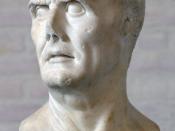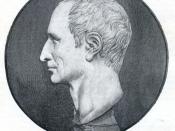Classics 2029: Roman Republican History
Did Caesar know what to do with his dictatorship?
Introduction
Julius Caesar, one of the most important historical figures in Roman history, remains to this day something of an enigma. Historians and other scholars have described him in widely divergent terms ranging from tyrant to democrat and from king to populist. This essay seeks to answer the question did Caesar know what to do with his dictatorship? It does so by examining the later years of Caesar's extraordinary life, concentrating on the time of his dictatorship, particularly from 47 B.C. until his death on the Ides of March, 44 B.C. The essay explores the raft of reforms introduced by Caesar during his dictatorship, changes which effectively brought Republican Rome to an abrupt end. It analyses Caesar's plans, goals and ambitions for Rome during this period, including the debate over his kingship, and investigates the problems and issues that ended in his assassination by a clique of jealous senatorial colleagues.
While it is obviously impossible to outline Caesar's definitive plans, it is difficult to argue with Yavetz' conclusion that "it is patently clear that Caesar, by the time of his death, was king in all but name" (Yavetz, 1983, 17).
Political Reforms
Kamm has argued that "Caesar was not the kind of reformer who carried others along with him, it was not a case of we can do it more effectively so much as I can do it more effectively" (Kamm, 2006, 145). This centrality of Caesar is best exemplified in his major reform, the introduction of a new constitution for Rome. In practice, he recreated a constitution built around a strong leader, consciously or subconsciously moulding a system which required one man to be in overall control. His political goals during this process were to suppress all armed resistance in the provinces, to create a strong central government in Rome, and to knit together the entire empire into a single cohesive unit. The first goal was accomplished when Caesar defeated Pompey and his supporters. To accomplish the other two goals, however, he needed to ensure that his control over the government was undisputed. This was achieved in two ways. First, he increased his own authority by assuming several important magistracies. This allowed him to initiate very sensible legislation on matters such as debt, corn supply, land settlements and provincial government and enfranchisement. By the time of his death, Caesar had held innumerable political offices and decision-making positions. Second, he reduced the authority of Rome's other political institutions by introducing several additional political changes including making the senate's membership more broadly representative than of Rome and Italy alone. The outcome of all of these developments was that "the popular assemblies were well on their way to becoming ciphers, Caesar's widespread patronage of equestrians, plebs and armies saw to this" (Shotter, 1994, 82). Several scholars support the need for such actions. For example, Mommsen argues that "Roman society was out of control and close to destruction, it was Caesar alone who attempted to take control of its history and directed it towards becoming a functioning Empire, envisaging himself as Emperor" (Mommsen, 1973, 12).
Problems
Even though Caesar had ostensibly removed the last of his rivals when he defeated Pompey and Cato, there were endemic challenges and problems he had to overcome to institute his desired political reforms. Despite crushing his enemies in the Civil War, attempting to restore stability to the Roman state proved difficult. Arguably, Caesar's most important problem was that he became too powerful: "the Roman Republic was an oligarchy in which the powers were shared among the senators. Even though the Senate was defeated, oligarchic sentiments were strong, and Caesar had to find a way to make his rule tolerable" (Byrd, 2001, 142). Baldson concurs, suggesting that the reconstruction of government was "in fact the largest problem which Caesar faced, and it was one which he seems to have made no attempt to solve" (Baldson, 1967, 71). Rather Caesar seemed to constantly evade the issue by leaving Rome and starting yet another new military campaign.
An alternative approach was to behave as a king, without actually using this title. Roman constitutional law allowed one way to exercise personal rule: dictatorship. Caesar was made dictator after his return from Ilerda; in October 48 B.C. he was again appointed, in 46 B.C. he became dictator for ten years and in 44 B.C. for life. This was, however, not a solution, since the dictatorship had already been misused by Sulla, as discussed below. A permanent consulship seemed to be a better response to the situation, and indeed Caesar had himself elected consul throughout the 40s. He also experimented with Pompey's innovation, the consulship without colleague (45 BC). Again, this didn't work: although repeated consulships were not unconstitutional, occupying various key positions permanently, such as a magistrature, made it impossible for the aristocrats to fulfil their traditional roles and their ambitions. As Bradford notes "they (senators) were with pride of rank and position, more than unwilling to become mere officials in the dictator's bureaucracy. In the appointment of consuls and other officials who were merely executors of his design, Caesar had removed all hope and ambition from the whole ruling class of Romans" (Bradford, 1984, 216). Throughout his dictatorship, Caesar failed to incorporate the senate into his governance plans- a key factor in his death.
Comparing Dictators- Sulla/Caesar
Sulla offers the only historical antecedent to Caesar's dictatorship. These two dictators marched on Rome for very different reasons and for very different ends. "Whatever the precise motives for Caesar's usurpation of power a broad justification for it may be found in the history of the Republic since the time of Sulla" (Gelzer, 1968, 42). Caesar initially set himself to mend rather than to end the Republic. Subsequently, "it was the failure of his attempt at reconstruction which gave Caesar reason to think that the Republic might be past mending" (Cary and Scullard, 1975, 282). Caesar made a frequent point of emphasising that he was seeking to act in a manner that was the precise opposite of that which Sulla had embodied; specifically, he encouraged clemency over proscription and progressive over regressive reform. "Caesar, from his lonely height of power, was always willing to forgive previous lapses by his appointees or even the downright hostility of his opponents, but he was perhaps unable to realize that those to whom this almost regal pardon was extended sometimes felt, like Cato, that he had no right to bestow" (Ehrenberg, 1964, 156). Suetonius has used Caesar's own words to describe Sulla as an illiterate in politics, and the res publica as a mere name without substance. Caesar, according to Suetonius, regarded Sulla as a fool for resigning his office (Suetonius, 1913, 84-87) thus leaving the restored res publica under the senate's weak leadership and at the mercy of political generals such as Pompey. Caesar, in contrast, became dictator in perpetuum in 44 B.C. thus destroying the very nature of the dictatura, the time limit which was the Republican safeguard against one man's supreme power. "Dictator Perpetus, a new concept and one incompatible with the Republican constitution, in essentials amounted to the same as rex, but avoided this hated word" (Fuller, 1965, 87). At the same moment when Caesar brought an ancient Roman tradition of extraordinary office to a culmination, its very nature as an office was destroyed. In a different sense he proved again that he was not a second Sulla, not illiterate in politics and not concerned with maintaining the empty form of the res publica.
Plans
Having reviewed Caesar's reforms and the challenges posed by these reforms, we now explore his plans for the future. Was he a tyrant or reformer, brilliant leader or the ultimate destroyer of the Republic? And what were his plans for his dictatorship? Did he wish to create a monarchy or did he actually have any plans for the future? These difficult questions have been argued for centuries and will never be satisfactorily resolved. Plutarch, however, was in no doubt of the answers: "what made Caesar most openly and mortally hated was his passion to be king" (Plutarch, 1972, 48). Others, such as Kalyvas, are more circumspect; he contends that there are "no real clues as to Caesar's actual state of mind upon the Republic and his own complex relationship with it" (Kalyvas, 2007, 430).
These latter arguments carry weight. Rome was going through a major political change. A strong case can be made that the factionalism, corruption, and constitutional gridlock of the late Republic was the product of a cityÃÂstate government being stretched to cover a Mediterranean-wide empire, an empire extended to Britain and the Rhine river by Julius Caesar himself. Caesar has often been accused of making his transition from Republic to a virtual monarchy too abruptly. In short, he was throwing old institutions on the scrap-heap before he had provided efficient substitutes. A monarchy may have indeed been in his mind as a solution. Equally, it can be argued that perhaps even Caesar himself did not know what his long-term intentions were, and that he was deferring any definite decisions while he focussed on solving short-term problems like maintaining economic stability, addressing the various social problems afflicting Roman society, and conquering Parthia. Canfora has argued that "there is an equal amount of hard evidence to support all of these assertions" noting that "Caesar did not draw up plans far in advance, preferring to exploit opportunities as they arose (Canfora, 2007, 93).
Conclusion
In all, Caesar only spent 17 months in Rome during the years 49ÃÂ44 B.C. Whatever long-range plans he may have had, he had little time to carry them out. Even so, two major but contradictory conclusions stand out. First, Caesar was master of the Roman world and he planned to exercise his mastery openly. This would indicate that Plutarch was correct in asserting that Caesar wanted to be king. Second, however, Caesar clearly took his position as leader of the progressive faction seriously. He expanded Roman citizenship, introduced a host of sensible reform and generally reduced the exploitation of all Roman subjects. Carson's analysis seems appropriate: "the truth would seem to be that Caesar had, at the time of his death, devised no formula to secure the future political stability of the Roman state" (Carson, 1957, 53). Another generation of civil war was required to destroy senatorial opposition and create the circumstances which were to make possible the compromise solution devised by Augustus.
Bibliography
Primary Sources
Plutarch, Fall of the Roman Republic, translated by Rex Warner, London: Penguin Books, 1972.
Suetonius, Life of the Deified Julius, translated by J.C. Rolfe, London: William Heinemann, 1913.
Secondary Sources
Balsdon, J.P.V.D., Julius Caesar and Rome, London: The English Universities Press Limited, 1967.
Bradford, Ernle, Julius Caesar: The pursuit of power, London : H. Hamilton, 1984.
Byrd, Robert C., The senate of the Roman Republic; Addresses on the History of Roman Constitutionalism, Hawaii: University Press of the Pacific, 2001.
Canfora, L., Life and times of the people's dictator, translated by Marian Hill and Kevin Windle, Los Angeles: University of California Press, 2007
Carson, R. A. G., "Caesar and the Monarchy", Greece & Rome, Second Series, 4, 1, 1957, pp. 46-53.
Cary, M. and Scullard, H.H., A history of Rome down to the reign of Constantine, London: Palgrave Macmillan, 1975.
Ehrenberg, Victor, "Caesar's Final Aims", Harvard Studies in Classical Philology, 68, 1964, pp. 149-161.
Fuller, J.F.C., Julius Caesar: Man, soldier, and tyrant, London: Eyre and Spottiswoode, 1965.
Gelzer, Matthias, Caesar: Politician and statesman, translated by Peter Needham, Oxford: Basil Blackwell, 1968.
Kalyvas, Andreas, "The tyranny of dictatorship: When the Greek tyrant met the Roman dictator", Political Theory, 35, 4, 2007, pp. 412-442.
Kamm, Antony, Julius Caesar: A life, New York: Routledge, 2006.
Mommsen, Theodor, The history of Rome, translated by William P. Dickson, New York: Scribner, 1973.
Shotter, David, The fall of the Roman Republic, New York: Routledge, 1994.
Yavetz, Zwi, Julius Caesar and his public image, London: Thames and Hudson, 1983.
Page � PAGE �7� of � NUMPAGES �8�
